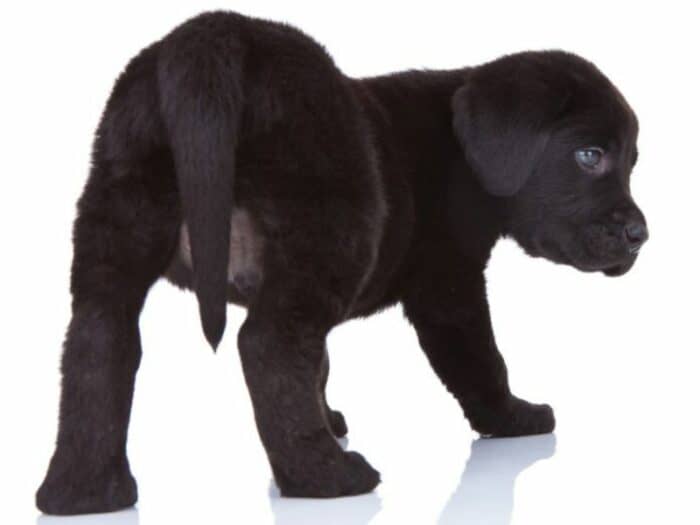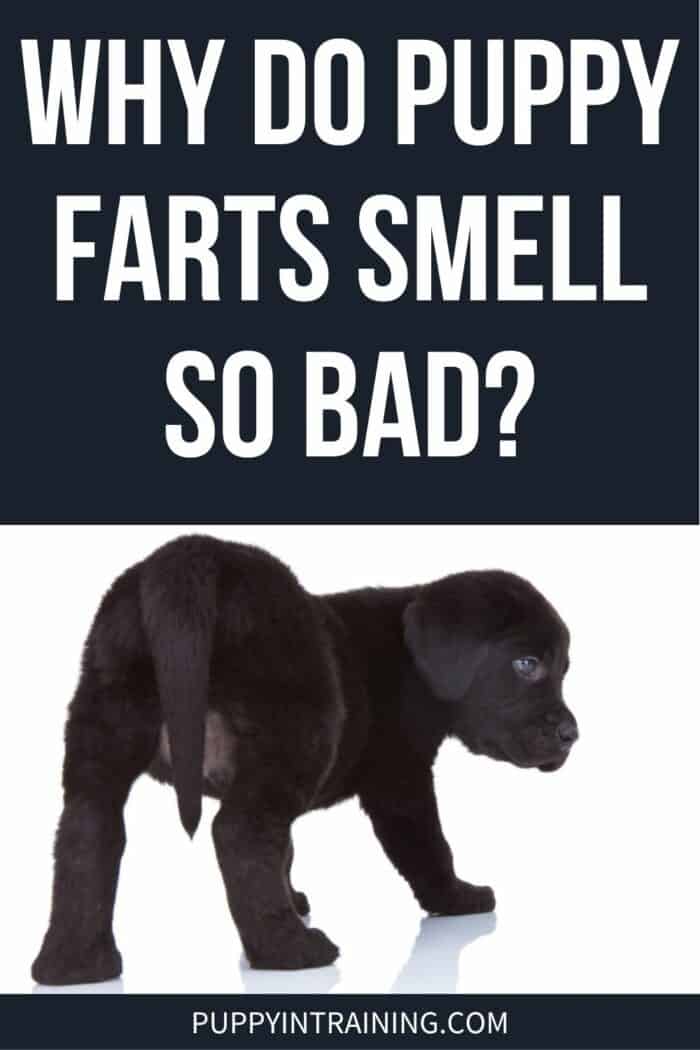Why Do My Puppies Farts Smell So Bad?
This post may contain affiliate links. We may earn money or products from the companies mentioned in this post.
While they may be unpleasant and embarrassing, farts are a normal part of life.
This is true for both humans and dogs. But why do my puppies farts smell so bad? Is this normal?!?
Flatulence happens as the result of bacteria breaking down the food we eat into usable components.
But some foods that are broken down in the colon produce a stinky hydrogen sulfide gas as a by-product of the work of the bacteria.
This gas needs to be released, and it does so as farts.
So, it is completely normal for puppies and dogs to fart. Different dogs will also fart different amounts based on their diet and natural gut microbiome.

That said, it is not normal for your puppy’s farts to smell so bad that you feel like you need a gas mask.
If your puppy suddenly starts farting more frequently, and more toxically, this is also probably a sign that something has changed in your puppy’s natural equilibrium.
The most common reason why your puppy will suddenly start farting more (or worse) is dietary.
In this article, we will go through the main dietary issues that cause excessive and smelly puppy farts and what to do about them.
Bad farting can also be a sign of a number of medical conditions, however, these will usually be associated with other symptoms. In this article, we will also take a look at some of those conditions.
OUR EXPERIENCE: We sometimes feed our puppies chicken and rice when their stomachs seem a little off. However, if your pup is having any kind of issues we highly recommend contacting your vet for more information on how to treat your puppy.
Why Do My Puppies Farts Smell So Bad?
The main reason why a puppy will have bad-smelling or excessively frequent gas is something about their diet. Consider the following when assessing the reasons behind your puppy’s farts.
Lactose Intolerance
While puppies and cats lapping up milk might be a cultural stereotype, puppies and cats are actually lactose intolerant and should not be given the milk that you drink.
They can’t digest the lactose properly, and this wreaks havoc in the stomach resulting in excess amounts of smelly gas that needs to be released.
If your puppy loves milk and doesn’t seem to want to hydrate in any other way, buy special dog milk that does not contain lactose.
Allergies
Some puppies may have allergies and food intolerances other than lactose, though it is worth noting that gluten intolerance is relatively rare among dogs.
If your dog is eating something she does not have a tolerance for, it can cause excessive farts as her body struggles to digest it.
Your vet will conduct various tests to determine what your dog is allergic to and may recommend an elimination diet to identify the food that needs to be removed from their bowl.
We put Stetson on an elimination diet but we were still not able to identify what was causing his skin allergies. After years of trying different diets and treatments, we learned it must have been environmental.
We moved to a new home and just like that his allergies cleared up. We’re not certain what the culprit was but we suspect it was the chemicals our association regularly applied to the grass in the common areas in our neighborhood.
Hard-To-Digest Foods
Some foods are easier to digest than others, and this is true for both humans and dogs.
If your dog is eating a lot of food that is difficult to digest, then their gut is working overtime and may produce more smelly gasses as a result.
Some of the main culprits for difficult digestion among dogs are cauliflower, broccoli, and brussel sprouts.
While these all contain great nutrients that are healthy for your pup, if they have bad farts, it might be time to actively limit their intake.
This makes a ton of sense with our current dog, Elsa. She eats anything and everything in our backyard from fruits to grass to leaves and she is one gassy dog. Fortunately, her farts aren’t extremely stinky but she farts way more than your average pup.
Excessive Fiber
Fiber is good for your gut health and digestion, and your dog needs sufficient fiber in their own diet to keep their system regular and prevent constipation.
But too much fiber can rush the digestive process, which again results in the production of excessive gas, which needs to be expelled as farts.
Check the fiber content of their diet and look out for the most common fiber fart culprits, which include brown rice, canned pumpkin, and apples.
Too Much Fat
Diets need to be balanced, and too much of anything can undermine the equilibrium of the intestinal tract. The result is often excess gas.
Too much fat is often at fault when farting becomes a problem. This can be particularly problematic for dogs on a raw food diet or that eat table scraps since these tend to be fatty morsels.
Try reducing your dog’s fat intake and see if that makes a difference to their farting. Also, don’t feed them table scraps! It encourages begging, and human food often contains things that dogs can’t eat.
Toxic Foods
We have already mentioned table scraps, but it’s worth mentioning them again because, not only can they cause excessive, smelly farts, but human food often contains ingredients that are toxic to dogs, such as onion and garlic.
Most spices aren’t great for your dog’s digestive system, either, and can result in problems if ingested. If you are accustomed to feeding your dog food off your plate, stop and see if this makes a difference.
Inhaling Air While Eating
Especially enthusiastic canine eaters can inhale a lot of air while gobbling down their food.
This is a particular problem among dogs with flat faces, like pugs, because of the way they need to suck up their kibble.
This air inhaled with food also gets pushed through the digestive tract and needs to be expelled.
If your dog devours their food at the speed of light, try a slow feeder to get them to slow down and inhale a little less air while eating.
Change In Diet
Despite the fact that they seem happy to eat pretty much everything, dogs have a sensitive digestive system. Changes in their diet can often cause a bad reaction in their stomach.
This is why it’s not recommended to just change your dog’s food at any time.
Instead, you should slowly move them between foods by mixing a gradually larger portion of their new food in with their old food over the course of about a week.
This gives their stomachs time to adapt.
Limited Microbiome
It is the microbiome in your dog’s stomach that is responsible for their digestion.
While some have a varied and diverse microbiome, others have a more limited range of microorganisms in their gut.
This can be the result of the environment in which they grew up or something like a course of antibiotics, which kills good gut bacteria along with other bad bacteria in the body.
You can try and improve your dog’s digestive system with probiotics, which introduce new, healthy bacteria into the gut.
More Serious Causes Of Smelly Farts In Dogs
While bad dog farts are usually caused by diet, farts can be a symptom of more serious medical conditions.
However, when this is the case, farting is very unlikely to be the only symptom, though it may be one of the first.
Below are some of the most likely medical conditions to be associated with farting.
- Canine Colitis – Inflammation of the large intestine; other symptoms include diarrhea and loose stool
- Irritable Bowel Syndrome – Malfunction of the intestinal muscles; other symptoms include diarrhea and constipation
- Intestinal Parasites – Including roundworms, hookworms, whipworms, tapeworms, and more; other symptoms include diarrhea, scooting, vomiting, distended abdomen, and weight loss
- Cancer – Uncontrolled cell growth that affects the body; other symptoms include unusual lumps, bumps, and sores, weight loss, lethargy
- Pancreatitis – Inflammation of the pancreas and malfunctioning digestive enzymes; other symptoms include nausea, vomiting, fever, lethargy, and abdominal pain
FAQs
Is it normal for puppies to have smelly farts?
It is normal for puppies to have quite smelly farts.
The digestive system is developing and they are trying lots of new foods that can be hard for them to digest at first.
Bad farts can be a sign of more serious medical problems, but they are usually associated with other symptoms.
Which dog breeds fart the most?
Dogs with flat faces, such as bulldogs and pugs, tend to inhale a lot of air while eating, so they also tend to fart a lot.
Other big farters include Doberman pinschers, golden retrievers, beagles, and Yorkshire terriers.
Keep Your Dog Smelling Fresh
If the smell of your dog’s farts is inconveniencing you, remember that you are what you eat.
It is probably something that they are eating that is causing excessively bad farts, so it’s time to examine and renew their diet.
But remember, some farting is a natural part of the canine digestive system.
If farting is accompanied by other symptoms such as diarrhea, lethargy, and pain in the abdomen, it is time to take your dog to the vet and identify what’s happening with them.
Does your puppy fart?
If so, are they abnormally stinky?
Tell us about your puppy in the comment section below.
Save To Pinterest

Top Picks For Our Puppies
- BEST DOG CHEW
We Like: Beef Collagen Sticks - All of our pups love to bite, nip, and chew. We love using Collagen Sticks to help divert these unwanted behaviors. - BEST PUPPY TOY
We Like: Calmeroos Puppy Toy w/ Heartbeat and Heat Packs - Perfect for new puppies. Helps ease anxiety in their new home. - BEST DOG TREATS
We Like: Crazy Dog Train-Me Treats - We use these as our high-value treats for our guide dog puppies. - BEST FRESH DOG FOOD
We Like: The Farmer's Dog - A couple months ago we started feeding Raven fresh dog food and she loves it! Get 50% off your first order of The Farmer's Dog.
Check out more of our favorites on our New Puppy Checklist.